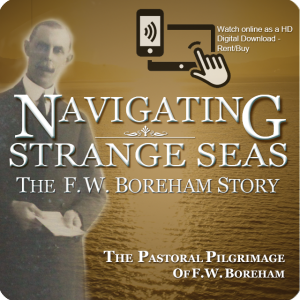home > books by FWB > 1945, A Late Lark Singing > Part 3, Chapter V, THE HARVEST IS PAST
Chapter V
The Harvest is Past
It was John Allen who gave me my text for the Harvest Festival this year. The brave record of John Allen will be found in the Minutes of the British Methodist Conference of the year 1810, ‘I was born’, he tells us, ‘in Derbyshire 1737. From eight years of age I had many serious thoughts; especially when it thundered and lightened or when I heard a funeral bell. When I was about sixteen, I was deeply convinced of sin by reading the eighth chapter of Jeremiah, particularly these words: The harvest is past; the summer is ended; and we arc not saved. I concluded that my day of grace was past. The thought almost broke my heart and caused me to weep bitterly before the Lord.’
The harvest is past! The summer is ended! We are not saved! The prophet’s parable is the Parable of a Beleaguered City. Hemmed in by hostile hosts, the garrison has scanned the horizon day after day in the fond hope of discovering some sign of the relieving forces. Supplies of food and of water are running so low that the men will soon be at their last gasp. And now autumn has come: the winter rains will soon convert the roads into an impassable quagmire: the season favourable to the advance of the succouring columns will have gone by. The harvest is past, they sigh; the summer is ended; and still we are not relieved! Those who have read Tennyson’s Defence of Lucknow or Banjo Paterson’s Ride to Kimberly, and those who have followed with breathless concern the attempts to relieve beleaguered garrisons in more recent wars, will thoroughly understand Jeremiah’s meaning.
I
The prophet’s picture vividly depicts the tragedy of a defective life-the lonely garrison separated from the main army, the part cut off from the whole. The man who, ignorant of history, stands isolated from all the romance and adventure of Yesterday, finds it difficult to play his part effectively as a citizen of To-day. The man who knows nothing of geography, and has no eyes for that pageant of life and colour presented by the continents and islands of the world, must of necessity find his outlook narrow, mean, and parochial. When men thought of this globe as the central orb — the only world worth mentioning—and regarded all the twinkling lights in the skies as celestial lanterns suspended there for our illumination, they enjoyed no sense of immensity, of infinity, of eternity. They were cribb’d, cabin’d and confined-insects crawling on a mound, flies buzzing in a closed room. Robert Chambers, the Scottish scientist and historian, says that the greatest day of his life was the day on which he found, in an old attic cupboard, a copy of the Encyclopaedia Britannica. Until that moment he had no idea of the existence of such things as literature, art, geology and astronomy. It was, he declares, like cutting a window in a prison cell through which he saw the world and the heaven beyond.
II
Now, this Parable of the Beleaguered City is of superlative value to us preachers. It elucidates a point on which men’s minds are in a welter of confusion. In listening to our sermons about sin and the need of salvation, thousands of our hearers silently ask themselves two particularly searching questions. What, they wonder, what is this dreadful state of dereliction and alienation against which the minister is warning me.’ And what exactly does he mean by the salvation of which he talks so much? Many a man, on his way home from church, puts to himself such queries. What are the enormities that I am assumed to have committed? What are the heinous offences of which I am supposed to be guilty? And, in all honesty, he finds it difficult to sheet home to himself any very serious charge.
But this Parable of the Beleaguered City makes it clear that the supreme tragedy of the human soul consists in its having become separated from God. It is not so much that I have committed any gross immorality, any bleak and loathsome transgression: it is that I have, almost inadvertently, allowed myself to drift out of vital touch with Him. Like the garrison in the besieged city, cut off from the main body and from its base of supplies, I have become detached from God.
This being so, it inevitably follows that the sinister forces that are bent upon my destruction will concentrate, not so much on inducing me to commit any horrible and outrageous iniquity, but on keeping me from any kind of contact with Him Who alone can help and deliver me. Those malignant powers that seek to compass the shipwreck of my soul are not so anxious that I should smash my way through the Ten Commandments, as that I should live my life in utter indifference to God. As long as there is no line of communication between myself and my Maker, I am utterly and lamentably lost.
And what, our congregations ask themselves, what does the preacher mean by salvation? What is it to be saved? What must one do to be saved? Is it the attaining of some lofty standard of virtue? Or what is it? This Parable of the Beleaguered City makes it clear. The city is saved when the imperial forces from which it has been severed come marching into its streets once more. The SOUL is saved when it is reunited with God. As soon as Christ enters the heart, bringing the wealth of His divine grace, the new day has dawned.
III
The deliverance of the garrison depends very largely on effective co-operation between the beleaguered and the relieving forces. In the last resort, of course, help can only come from without. Everything – or almost everything-depends on the organization, equipment, and despatch of a force powerful enough to cut its way through the hordes of the besiegers, reuniting the isolated garrison with its base.
But the garrison must not remain passive and inactive. There must be wistful expectation and sleepless vigilance: there must be ceaseless resistance and uncompromising defiance: there must be sallies and sorties: there must be a swift sensitiveness to detect any sign of approaching relief, and an ingenious readiness to aid the relievers by signals or directional information. In Banjo Paterson’s poem, he tells of the messages that the starving people, shut up in Kimberley, flashed by heliograph to Lord French’s advancing columns; and we all know how, at Lucknow, Jessie Brown, straining her ears, electrified the soldiers by declaring that she could catch the sound of distant bagpipes. ‘Dinna ye hear it?’ she cried. ‘Dinna ye hear it?’
Outram and Havelock breaking their way through the fell mutineers, Surely the pibroch of Europe is ringing again in our ears!
Similarly, it is by the eager co-operation of the human soul with the divine forces that are working for its salvation that deliverance is triumphantly effected.
IV
The haggard men posted on the city walls shade their eyes with their hands as they look this way and that way for any sign of SUCCOUR. But there is none. They shiver as they feel the keenness in the autumn wind. the harvest is past, they say to one another, the harvest is past, the summer is ended, ad still we are not relieved! But what then? We are not saved, it is true; but, on the other hand, we are not lost! The city has not fallen to the foe! In the Life of George Whitefield it is recorded that on one occasion he was preaching to a congregation that included Lord Chesterfield.
Whitefield was arguing that a man who has no guide but his own reason is like a blind man being led by a dog. He described the man making his dangerous way along the brink of a precipice, clutching the string that bound him to his dog. Suddenly, by a telling gesture and a look of horror on his face, Whitefield cleverly suggested that the blind man’s foot had slipped. Lord Chesterfield sprang to his feet in alarm. ‘Good heavens,’ he cried, ‘he’s gone!’ Whitefield paused and, addressing Lord Chesterfield, exclaimed, ‘No, my lord, he is not quite gone; and, since he is not yet lost, he may still be saved!’
A similar thought thrilled poor Mr. Scrooge when, on Christmas morning, he awoke from his terrible dream. All the grim visions of the desolating consequences of his greed were but a nightmare after all! The ghastly things had never happened! He was not the lost soul that he had thought himself to be! He could not express his thankfulness. He repudiated all the selfishness that had disfigured his wretched and vowed that henceforth he would live only to secure the happiness of others.
‘Scrooge’, says Dickens, ‘was better than his word. He did it all and infinitely more. He became as good a friend, as good a master, and as good a man as the good old city knew. Some people laughed to see the alteration in him, but he let them laugh. His own heart laughed and that was quite enough for him.’
To be sure, he was not saved. His dreadful dream had shown him that. But the unforgettable sensation of his waking moments was the realization that he was not irreparably lost. Since he was not lost, salvation was at least possible. If salvation was possible, Scrooge vowed that it should become actual. And so it came about.
V
Still, since the harvest is past and the summer is gone, the situation is as near to being desperate as it can very well be. The most favourable time for relief has slipped away. If no succour came in summer-time, and none in autumn-time, is it likely to come in winter-time?
Harvest-time and summer-time! There are periods that are more favourable than others to the salvation of the soul. Youth, of course, is the natural and obvious period. Some years ago Dr. Starbuck made an exhaustive study of the phenomena of conversion and published the results of his investigation in a suggestive volume in the Contemporary Science Series. Having sent out forms to no fewer than twelve hundred persons of note in the religious world, asking for particulars concerning their own conversions, he set to work to elaborate his replies. He found that a good number were converted between the ages of seven and nine; many more between nine and twelve; and a greater number still between twelve and sixteen. Between sixteen and twenty there are fewer; fewer still between twenty and thirty; and after thirty they are very rare. These findings are almost frightening.
In the work with which we set out-the personal confessions of John Allen, the eighteenth-century revivalist-we were impressed by the fact that it was at the age of sixteen that John Allen ‘almost broke his heart’ and ‘wept bitterly before the Lord’, because of his conviction that his harvest-time had passed and that his summer-time had ended, leaving him yet unsaved. At sixteen, mark you! In the Journal of Andrew Bonar, the friend and biographer of McCheyne, I find this entry on his nineteenth birthday: ‘May 31 1829. My birthday is past and I am not yet born again!’ John Allen terrified lest, at sixteen, he had left the great transaction until it was too late! Andrew Bonar similarly worried at nineteen! On the face of it, these fears seem a trifle absurd. And yet Dr. Starbuck’s conclusions prove that both Allen and Bonar had good ground for apprehensions. Youth is the ideal time, the normal time, the usual time; and if youth has begun to fade, the alarm expressed in the prophet’s parable becomes the fitting and natural attitude of the soul: The harvest is past; the summer is ended; and we are not saved.
VI
We are not saved! Contrast the gloom of those four words with the gladness of the We are saved! in Tennyson’s famous poem. He describes Havelock’s glorious Highlanders entering Lucknow:
Dance to the pibroch! Saved! We are saved! Is it you? Is it you?
Saved by the valour of Havelock. Saved by the blessing of heaven!
And the closing lines of Banjo Paterson’s ballad on The Relief of Kimberley are set in the same key:
And French rode into Kimberley: the people cheered amain;
The women came with tear-stained eyes to kiss his bridle-rein;
The starving children lined the streets to raise a feeble cheer;
The bells rang out a joyous peal to say, Relief is here!
Are there any records in our British annals more moving than these stories of the relief of beleaguered cities? The joy of it takes me back to John Allen, in whose company we set out, For although he felt at sixteen that his harvest-time was past and his summer ended, his imperilled soul was saved after all. ‘I was one day crying to God’, he tells us, ‘when I felt the love of God shed abroad in my heart and was constrained to cry out:
‘For sinners like me
He died on the tree.
Ah, who would not love such a Saviour as Thee?
‘My soul was filled with peace and I rejoiced in the hope of the glory of God.’
And so, as in the relief of the city, tears of overwhelming grief give place to tears of inexpressible gratitude. The succouring forces have entered the city: the Saviour has entered the soul!
-F.W. Boreham




















0 Comments